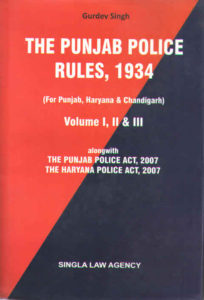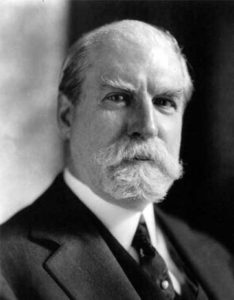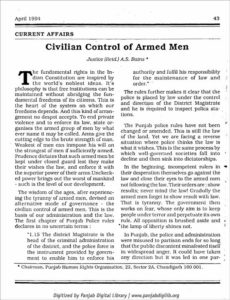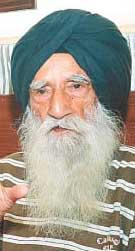Civilian Control of Armed Men
In this piece, Justice Ajit Singh Bains delineates the relationship between rule of law and those who are supposed to maintain law and order. He dwells on how power without responsibility creates a situation suitable to the state and milked by the state agencies. The fundamental rights in the Indian Constitution are inspired by the world’s noblest ideals. Its philosophy is that free institutions can be maintained without abridging the fundamental freedoms of its citizens. This is the heart of the system on which our freedoms depend. And this kind of arrangement no despot accepts. To end private violence and to enforce its law, the state organises the armed group of men by whatever name it may be called. Arms give the cutting edge to the brute strength of man.
![In this piece, Justice Ajit Singh Bains delineates the relationship between rule of law and those who are supposed to maintain law and order. He dwells on how power without responsibility creates a situation suitable to the state and milked by the state agencies. The fundamental rights in the Indian Constitution are inspired by the world’s noblest ideals. Its philosophy is that free institutions can be maintained without abridging the fundamental freedoms of its citizens. This is the heart of […]](https://www.theworldsikhnews.com/wp-content/uploads/2022/02/Injustice-360x266.jpg)
THE WEAKEST OF MEN CAN IMPOSE HIS WILL ON THE STRONGEST OF MEN IF SUFFICIENTLY ARMED. Prudence dictates that such armed men be kept under a closed guard lest they make their wishes the law, and enforce it with the superior power of their arms. Unchecked power brings out the worst of mankind.
The wisdom of the ages, after experiencing the tyranny of armed men, devised an alternative mode of governance – the civilian control of armed men. This is the basis of our administration and the law.
The first chapter of Punjab Police Rules declares in no uncertain terms:
“1.15 The District Magistrate is the head of the criminal administration of the district, and the police force is the instrument provided by the government to enable him to enforce his authority and fulfil his responsibility for the maintenance of law and order.”
 The rules further make it clear that the police are placed by law under the control and direction of the District Magistrate and he is required to inspect police stations. The Punjab police rules have not been changed or amended. This is still the law of the land. Yet we are facing a reverse situation where police think the law is what it wishes.
The rules further make it clear that the police are placed by law under the control and direction of the District Magistrate and he is required to inspect police stations. The Punjab police rules have not been changed or amended. This is still the law of the land. Yet we are facing a reverse situation where police think the law is what it wishes.
This is the same process by which well-governed societies fall into decline and then sink into dictatorships.
In the beginning, incompetent rulers, in their desperation, themselves go against the law and close their eyes to the armed men not following the law. Their orders are: show results; never mind the law! Gradually, the armed men forget to show results with the law. That is tyranny. The government then works on fear, whose only aim is to keep people under tenor and perpetuate its own rule. All opposition is brushed aside and the lamp of liberty shines not.
The blind men in power (police and political) saw not its consequences and agreed. The tie rope, which had been put around the armed men’s neck, was slackened a little. The process went on, each failure was blamed on law, and more control was set aside.
In Punjab, the police and administration were misused for partisan ends for so long that the public discontent manifested itself in widespread anger. It could have taken any direction but it was led in one particular path, for it seemed, at that time, to the two principal parties that it is in their short term interest. The rulers reprimanded the police and received a short reply for its failure: the law is too stringent over them, relax it a little bit for them, and see results, they gently insisted.
The blind men in power saw not its consequences and agreed. The tie rope, which had been put around the armed men’s neck, was slackened a little. The process went on, each failure was blamed on law, and more control was set aside.
The new unaccountability led to more crime but was not noticed in the general unrest. The local institutions like panchayats were devalued first, followed by courts. Professionals like doctors and lawyers’ protests were ineffective. Journalists were silenced by the simple expedient of killing the most vocal one. The same trick was tried on lawyers. And finally, it came to the administration itself. The officers were humiliated when they dared to visit the police station as if it were private property.
 Reflect over the words of eminent jurist and Chief Justice of the US Supreme Court -Justice Evans Hughes:
Reflect over the words of eminent jurist and Chief Justice of the US Supreme Court -Justice Evans Hughes:
“The greater the importance of safeguarding the community from incitement to the overthrow of our institutions by force and violence, the more imperative is the need to preserve inviolate the Constitutional right of free speech, free press and free assembly in order to maintain the opportunity of free political discussion, to the end that government may be responsive to the will of the people and that changes, if desired, may be obtained by peaceful means. Therein lies the security of the Republic, the very foundation of Constitutional government.”
These words came out when the very right to life was not in question in the USA as in Punjab today. The Terrorist Act [the Terrorist and Disrputive Activities (Prevention)] Act does not authorise police officials to compile lists for elimination. Nor does TADA permit the kind of escape of prisoners which police had made into a perverse art.
Frightening revelations have come from the state itself. The PCS officers strike has proved what human rights organizations have been crying for so long. The demon had started eating its own children.
In Punjab today, each police station has become a medieval castle where the worst of crimes is committed with state sanction. The stations are out of bounds for all people except the criminals themselves. The magistrate can’t visit them; judicial officers are too timid to interfere.

This article was published in The Sikh Review in April 1994. This article was retrieved from the archives of the Panjab Digital Library.
Captured deadly weapons like AK 47 are not accounted for. No list was made for deposit in armouries. Who is using it and to what ends? Police officials using the captured vehicles for what use, no one knows. Each police station has become a medieval castle where the worst of crimes is committed with state sanction. The stations are out of bounds for all people except the criminals themselves. The magistrate can’t visit them; judicial officers are too timid to interfere.
The sacred writ of habeas corpus made a futile formality by a simple expedient of posting of intelligence officers in the registry of the High Court. The moment a habeas writ is filed, a wireless message is flashed to the concerned police station to shift the confined men elsewhere.
How does the High Court behave? It simply believes the worthless affidavits of police and lets the matter rest.
How does the High Court behave? It simply believes the worthless affidavits of police and lets the matter rest.
Everyone knows people by the tens of thousands were murdered every day by the state agencies.
But how to keep this flame of liberty burning when each state officer is faithless toward the law and knows not that the fire of lawlessness eventually consumes everyone.
 Justice Ajit Singh Bains passed away on 11 February 2022. He was a human rights champion throughout his life.
Justice Ajit Singh Bains passed away on 11 February 2022. He was a human rights champion throughout his life.
